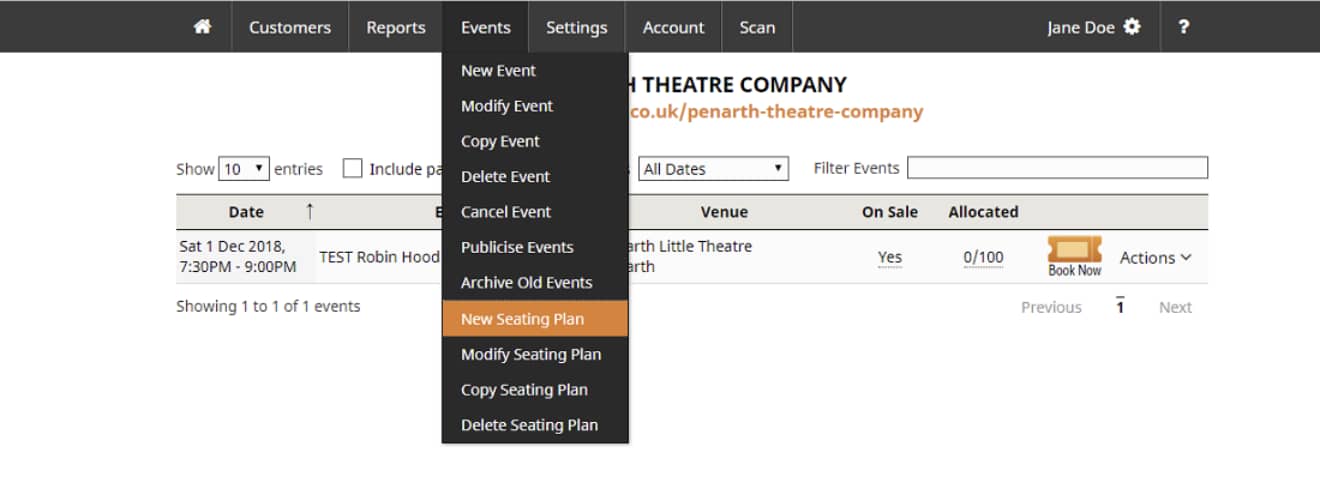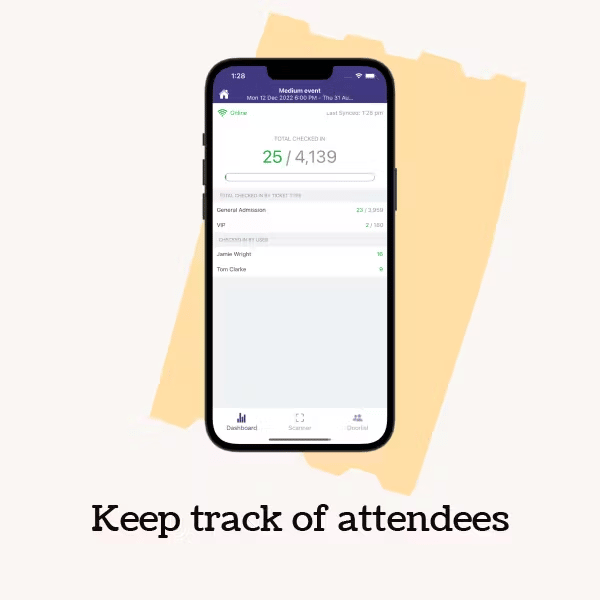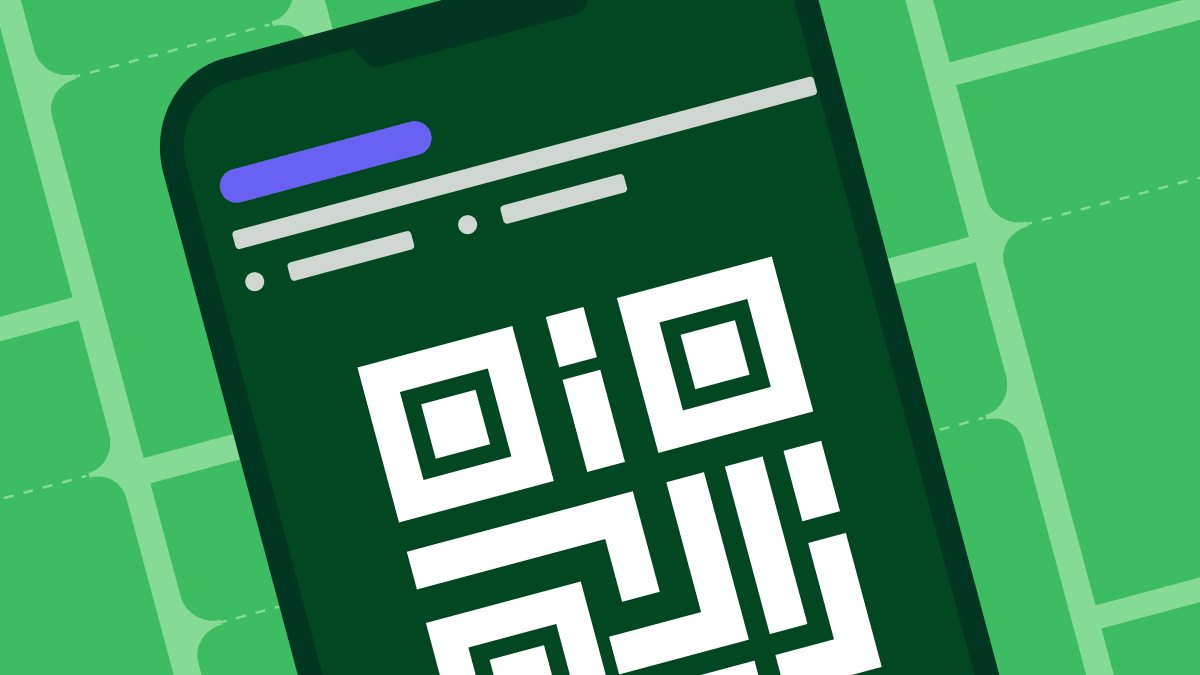Event organization involves managing ticket sales, registration and entry – all while engaging attendees and delivering a memorable experience.
The right event ticketing software streamlines this complex process, handling ticket creation, payment processing and event management to ensure your events run smoothly.
In this article, you’ll learn what to look for in event ticketing software and discover 11 options to help sell out your next event.
What to look for in event ticketing software
The best event ticketing software solutions help you sell tickets, promote your event and register attendees in one place. You can use them to customize tickets, communicate with your audience and track performance data to understand your most profitable channels.
The features you need will vary depending on your business and the type of events you run. However, the following features are must-haves for any event organizer:
Intuitive, user-friendly interface | Easy setup and navigation, even for users with limited technical expertise. |
Ticket customization | Multiple ticket types for different attendees and events, including the ability to set pricing and create sales promotions. |
Integration capabilities | The ability to sync attendee data to your CRM, marketing tools and accounting software to streamline event management. |
Secure payment processing | Robust card payment systems with encryption and fraud detection. Plus, support for payment gateways such as PayPal, Stripe and Square. |
Communication features | Customizable registration forms and email automations for sending welcome messages, event updates and reminders. |
Analytics and reporting features | User-friendly insights and reports to track sales, revenue and attendee engagement. |
Mobile app | An attendee app to manage check-in and engage attendees with in- and post-event content (e.g., polls and feedback surveys). |
Customer support | Self-service resources and help-desk features to support event teams and attendees through their preferred channels (e.g., email, phone or chat). |
Now that you know what to look for, here are 11 handpicked event ticketing platforms to sell tickets and manage events efficiently.
1. Best event management system with ticketing integrations: Pipedrive
Businesses can integrate Pipedrive’s event management CRM with ticketing software to track engagement, handle registrations and build connections with attendees.
While it’s not a standalone ticketing solution, event managers can leverage Pipedrive’s time-saving automated workflows to streamline engagement at every customer journey stage.
For example, you might set up automations to automatically:
Add new registrations to an attendee email list
Schedule welcome emails to build anticipation and excitement
Set up tasks for personalized email outreach
Adding Pipedrive’s Campaigns add-on to your CRM lets you segment attendees based on their preferences, participation or previous engagement. You can use this to create targeted email marketing campaigns.
For instance, if some customers prefer online events over in-person conferences, segmenting them ensures you send relevant content to increase engagement and attendance.
Pipedrive’s 360-degree tracking gives you full visibility into your event’s performance. You can connect all customer interactions from a single dashboard to see how attendees move through your sales pipeline.

Additionally, you can monitor performance with real-time reports and insights detailing key metrics such as registration volume and conversion rates.
Analyzing interactions helps you understand how and where customers engage with your content to deliver better experiences that boost long-term attendance. One G2 reviewer says using Pipedrive has transformed their workflow:
Price: Pipedrive has several pricing plans to suit different needs. Try it for free with a 14-day trial.
2. Best all-in-one event ticketing platform: Eventbrite
Eventbrite is an event ticket management software that aims to simplify online ticket sales and registration for entrepreneurs.
Its all-in-one software has tools to build customizable event landing pages, sell tickets and market events.

One of Eventbrite’s biggest selling points is its reach. Event managers can use the platform’s marketplace to showcase events to millions of active ticket buyers using the platform to discover activities.
A G2 reviewer cites the platform’s popularity as a key component for putting on successful events:
Users can grow visibility and drive traffic to their ticketing page with native event marketing features, including:
Eventbrite Ads on the website homepage, related events and search results
Custom social media ads on TikTok, Instagram and Facebook
Email marketing tools for tailored outreach
Personalized recommendations that target relevant audiences
Automated event notifications for people who like, follow or attend your events
Promo codes, discounts and deal creation
In-depth reports on customer insights and marketing performance
When customers are ready to checkout, Eventbrite’s secure payment processing simplifies checkout, including Google Pay and Apple Pay integration to speed up ticket purchases.
The platform also offers Embedded Checkout functionality, making it easy for users to buy tickets without leaving your website.
Managers who work on the go can use Eventbrite’s Organizer App to track ticket sales, complete attendee check-ins and monitor performance in real time.
Price: Event organizers can publish events for free. Attendees pay a 3.7% + $1.79 service fee plus a 2.9% payment processing fee per order on paid tickets.
3. Best for beginners: TicketSource
TicketSource is a free ticketing solution with easy-to-use features for promoting, selling and managing any event online.

TicketSource users can leverage an organizer’s toolkit to:
Create a custom-branded ticket shop
Embed events on a business website
Promote events on social channels and email marketing platforms
Create discount codes and seating plans
Set up e-tickets, mobile tickets and thermal tickets
Scan tickets to confirm registration
Track ticket category and income metrics
Gather audience feedback via questionnaires
TicketSource’s usability and price point will appeal to organizers who want a fuss-free way to manage their event.
As one G2 reviewer notes:
While some reviewers mention that ticket printing could be easier, TicketSource’s event organizer help center provides solutions to overcome issues.
Price: free to use for event organizers. TicketSource charges a 3.5% + $0.99 per paid ticket processing fee on card payments and a $0.99 per paid ticket processing fee on Stripe payments.
4. Best for event management: Eventilla
Eventilla’s event management platform helps businesses streamline the event lifecycle, from planning to selling tickets and collecting attendee feedback.
A common plus point among Eventilla’s users is its simplicity for varied events. As the below review on Capterra highlights:
Like Eventbrite and TicketSource, Eventilla’s intuitive interface makes creating customizable sales pages and registration forms easy. However, the platform goes deeper with communications.
Users can interact with participants via SMS and email before, during and after events.
Here’s how organizers and marketers might use Eventilla’s tools to engage attendees:
Send personalized confirmation messages, including unique QR codes for entrance
Direct attendees to the right location
Highlight event benefits and provide tailored recommendations during an event
Send customer surveys to gather feedback to improve future events
Send promotions and reminders about upcoming events

Event managers can integrate Eventilla with essential business apps to maximize user experience.
For example, connecting Eventilla to Pipedrive lets you share important contacts with your CRM system. Sales and marketing teams can use data to nurture leads and deliver a consistent experience across every touch point.
Price: from €179 per month.
5. Best for creative and cultural organizations: Ticket Tailor
TicketTailor is a ticketing platform that helps over 73,000 creators sell online tickets for a wide variety of events.
While the platform’s tools suit any business, Ticket Tailor markets itself toward creative and cultural organizations running workshops, courses and live performances.
What TicketTailor lacks in advanced customization, it makes up for in simplicity and fair pricing.
One Google reviewer says Ticket Tailor can be useful for anyone who wants a hassle-free ticketing system:
TicketTailor walks new users through setup with templates to create an event page. It also offers flexible ticket features to tailor a page before going live, including:
Multiple ticket types and pricing tiers
Ticket groups and bundles, including donation options
Bespoke seating charts
On-sale scheduling and waitlist creation
Custom booking and transaction fees
PayPal, Stripe or Square integration
Event organizers can use Ticket Tailor’s mobile app to manage guest check-in, email communication and refund processing when an event is live.

The app also offers real-time check-in data to track admissions. Combining this with onboard analytics gives users a complete view of revenue and engagement to inform future marketing strategies.
Price: Ticket Tailor has three plans for different business needs. Users can buy credits in advance from $0.28 or use pay-as-you-sell pricing from $0.75. Businesses running free events can issue up to 5,000 free tickets a year without fees.
6. Best for affordable ticket fees: EventBookings
EventBookings is a complete event ticketing system software for businesses that want to keep costs down. Its $0.30 + 1% per ticket sold fees are the lowest in the industry, meaning event organizers can set ticket prices lower and keep more of their sales revenue.
Affordable pricing is a key selling point of EventBookings, but it’s not the only one.
The intuitive platform helps event teams create, manage and promote events. EventBookings’s features include:
Free event page templates and smart registration forms
Multiple session and ticket options with a PCI-compliant payment gateway
Customizable event branding and ticket coupons
Built-in video conferencing for online events
Emailing marketing tools
Personalized guest portals
Mobile ticket scanning
Conversion tracking reports

A Capterra reviewer also highlights the company’s customer-centric approach:
Some users note that reports aren’t as user-friendly as other features. However, EventBooking’s help center and support team is a useful resource for addressing issues.
Price: $0.30 + 1% per ticket sold. For free events, organizers can issue the first 300 tickets without fees.
7. Best for multi-day events: Purplepass
Purplepass is an event ticketing and management hub with robust features for organizing ticket sales and customer engagement.
The platform has everything event managers need to set up and promote events, including:
Custom ticket types with user-defined options for groups (e.g., VIPs, children, veterans, etc.)
Custom event pages, URLs, messages and checkout questionnaires
Email and SMS marketing communication features
Guestlists for staff, media and VIPs
Free seating maps and colour-coded seat price customization
Attendee ticket transfers
Merchant account integration
Businesses that run multi-day or recurring events can use Purplepass’s tailored event types to stay organized.

For example, users can create tickets for a three-day event and sell them on one page rather than create individual pages. Organizers can also save time by scheduling ticket sales for repeat events (e.g., networking events or workshops).
Purplepass’s easy-to-use features include strong customer support to help the ticketing process run smoothly. As one Software Advice reviewer points out:
Price: Purplepass charges 2.0% (nonprofit) or 2.5% (for profit) + $0.99 per ticket online fees, plus 3.0% (online) or 2.5% (box office) credit card processing fees. There are additional fees for bulk pre-printed tickets and custom wristbands.
8. Best for virtual events: RegFox
RegFox is an event registration platform for online conferences, workshops and conferences – as well as in-person retreats.
Its event page builder includes 40+ field types to create professional ticket pages without technical knowledge.
One useful feature is the ability to apply conditional logic workflows to automate registrant paths. Organizers can use this to personalize the ticketing experience around actions to boost ticket sales.
For example, forms can dynamically apply a 15% discount if customers book before May 31 or show valid member details for an after-party.

Other engagement features include:
An Engage attendee app to send event details and updates to mobile devices
Email drip campaigns and text message communication
Simple refunds and cancellations
Custom QR codes for faster on-site check-in
Merchandise and product add-ons for upselling
On-demand badge printing
Payment plans for attendees
Once a campaign is live, event managers can access real-time analytics to track conversions and evaluate performance.
The range of options for setting up and promoting an event can overwhelm new users. However, RegFox ranks well for user support, as the below G2 review highlights:
RegFox’s help center has dozens of articles and video tutorials to solve most problems. Event organizers can also connect with a team member via live chat, email or phone.
Note: For in-person events and attractions, including concerts, fairs, festivals and museums, RegFox’s sister company TicketSpice offers a similar feature set but gathers less information about registrants.
Price: $0.99 + 1% per registrant for paid events, plus standard card fees. RegFox caps fees at $4.99 per registrant.
9. Best for B2B events: Bizzabo
Bizzabo is an enterprise-level online ticketing platform for running business-to-business (B2B) conferences and hybrid and field events. Its intuitive Event Experience Operating System (OS) helps organizers coordinate every aspect of events, from registration to ticket sales and attendee engagement.

The platform’s event management features include:
Free and paid ticket types
Custom website builder
Referral marketing and cart abandonment tools
Registration flows and email segmentation
Virtual event Q&As, polls and brandable chat channels
Attendee mobile event app
Real-time session attendance and adoption insights
For in-person events, businesses can also leverage Bizzabo’s Klik SmartBadge technology to boost engagement.
Klik turns a traditional event badge into a wearable device. Badges make it easy for attendees to share contact information with a tap, removing the awkward transactional element of networking.
Organizers can also track badge activity during events to monitor attendance, booth traffic and dwell time. Businesses can use this data to demonstrate event return on investment (ROI).
According to Bizzabo, Klik increases exhibitor leads by 400% and boosts contact exchanges by 250%.
Users praise Bizzabo’s all-in-one platform and customizations. However, new users might find features overwhelming. As one Software Advice reviewer notes:
Event managers can use Bizzabo’s knowledge center and on-demand demo library to speed up onboarding.
Price: Bizzabo’s Event Experience OS starts at $17,999 per year, billed annually. Klik SmartBadge is available as an on-demand add-on.
10. Best for private events: RSVPify
RSVPify is a leading private event management platform with ticketing and planning features. The software offers secure and private registration for invite-only events (e.g., corporate retreats or board meetings) and VIP guest lists.

Organizers can choose to secure ticketing with restricted RSVP access and unique codes for event registration. RSVPify also ensures guest data is never sold to a third party or used to send SPAM communications.
Setting up events is free, with unlimited tickets and daily revenue payouts through Stripe. Users can leverage RSVPify’s intuitive event management features to:
Create a custom-branded event website or registration page
Manage and track sessions
Send automated invitation, confirmation and reminder emails
Collect personalized data (e.g., phone numbers, headshots and arrival plans)
Process card payments and donations
Track and manage guest lists
Users praise RSVPify for its ease of use and range of tools. One G2 reviewer recommends the platform for running repeat events:
However, another reviewer notes the lack of features found on other platforms:
Users can submit feature requests and get advice about event ticketing and planning in RSVPify’s active community forum.
Note: RSVPify’s event ticketing is currently available in 35 countries. However, organizers can accept payments from any country.
Price: from $24 per month.
11. Best for event planning: EventCreate
Event organizers use EventCreate to plan events, sell tickets and collect payments on a single, integrated platform.

The software is suitable for multiple event types, from conferences to fundraisers. One Software Advice reviewer recommends it as a solution for nonprofits:
The software’s ticketing features include:
Service fee-free ticketing with instant payouts
Custom registration forms and coupons
Online and offline secure payment methods
Ticketing add-ons (e.g., brand merchandise and raffle tickets)
Custom fee and tax options
Seat chart maker
Dedicated check-in mobile app
Users also get a suite of tools to speed up event planning, including customizable website templates and invitation forms. All promotional materials are fully white-labeled, so businesses can add branding or host their ticket website on a custom domain.
When an event is live, event teams can monitor key performance indicators (KPIs) such as revenue, tickets sold and conversion rate from a single dashboard. Business leaders can use this information to set budgets and inform the sales strategy for their next event.
Price: EventCreate has three plans for different event needs, from $29 per month (billed annually).
Download your free sales sheet template
Final thoughts
The right ticketing software for events streamlines ticket sales and event management, freeing you up to focus on generating leads and engaging attendees.
Pipedrive turns attendee data into valuable insights you can use to boost registrations and enhance customer experience.
Try Pipedrive free for 14 days to see how its event management features can optimize your event sales pipeline.










